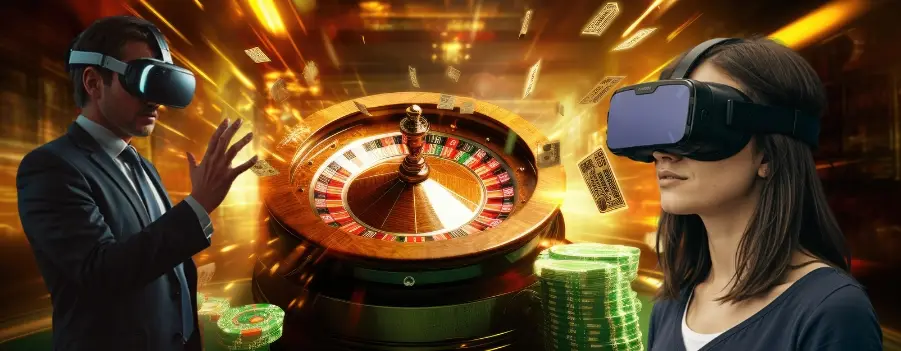How are emerging technologies transforming games of chance?

Games whose outcome is purely based on chance are clustered under “games of chance.” Their significance dates to the ancient past. Some examples are, lotteries, bingo games, sports betting, raffles, and similar others. These classical games are limited by space, expertise, lack of social interaction, fraudulent activities, and game addiction. The recent innovative technologies are life-savers to overcome these limitations and to inculcate a sportive atmosphere in reshaping gaming experiences. This article digs into the amazing technologies in this gaming realm, which is a real eye-opener to every passionate gamer.
Virtual Reality (VR) and Augmented Reality (AR)
Virtual Reality (VR) and Augmented Reality (AR) create an exclusive three-dimensional immersive environment that’s purely computer-generated. VR/AR lets the player experience the realistic surroundings with the enticing sound effects, replicating the nuances in a real environment. The uniquely designed VR headset lets you feel the magic. The ocular tracking and cutting-edge graphics technologies assist in these breakthroughs. It generates 3D images and videos by incorporating impressively immersive backgrounds.
VR devices have interactive software and hardware, good enough for gaming applications. The player can literally move around, touch and feel objects, and shoot bullets directly at enemies, which makes the gaming experience enthralling, entertaining, and engaging. Racing games give the real feeling of driving a car on the highways, in the woods, and on the terrain. Technological giants have emerged with their headsets employing VR to engage players with an unbeatable gaming experience.
Digital Transformation of Lottery
When it comes to lottery games, the rise of internet connectivity and mobile gadgets has transformed how traditional lotteries function. With the shift to online lotteries, players purchase their tickets and partake in draws right from their homes at their ease and comfort. This impact of technology in traditional lotteries has extended into a wider ecosystem of online gambling platforms, providing room for players to participate in lottery-style games along with traditional casino games. The emergence of cryptocurrency lottery marks the pinnacle of digital transformation in gaming.
Mobile apps are pivotal in leading gamblers into a refined dimension of the gambling experience. Players have a wide range of virtual games to pick from through game apps in a few clicks. Irrespective of whether they are at home, work, or travel, game apps are accessible 24*7. A dedicated internet connection along with a fully charged mobile device works wonders. Mobile gaming apps transcend regional restrictions, time zones, and physical inabilities to walk into a casino to quench gambling passion.
Blockchain
The underlying technology that makes all the above-discussed innovative trends possible is the most coveted Blockchain Technology. Blockchain uses the immutable, decentralized ledger that ensures the integrity of transaction history. Once a transaction is added to the blockchain, deleting or altering it is impossible. This ensures transparency of transactions.
Users are vested with a pair of cryptographic keys – private and public. Upon initiating a transaction, the private key creates a digital signature, verified along with the transaction details, and then verified by the network’s other participants using the sender’s public key. This ensures unmatched security, as only the rightful owner of the private key can initiate transactions. Blockchain-based games operate on the outcomes of the Random Number Generator (RNG) which ensures fair play.
Artificial Intelligence (AI)
With innovations in VR/AR, blockchain-based games are assured to reach heights in the online gaming world. AI, when blended with these, is certain to bring in an inevitable gambling experience far beyond human comprehension.
AI algorithms can potentially analyze a player’s behavioral pattern to tailor gaming preferences. This includes recommending bets, adjusting gaming difficulty levels, suggesting new games, manipulating themes to blend with taste, and suggesting bonuses to match gaming choices. AI uses the player’s data to adjust his preferences in real time, which ensures every session is uniquely challenging and engaging compared to the previous. Possible problems are identified and prevented using AI’s potentially proven algorithms.
Conclusion
In the journey towards transformation of games of chance in the casino industry, VR/AR and AI stand firm as monumental pillars, driving innovation beyond conventional horizons of gaming, personalized experiences, and security. The culmination of innovation lies in the blending of VR/AR and AI with blockchain technology. These technological innovations, when exploited in the right perspective, are assured to carve niches in the gaming sphere that will speak volumes in the ages to come.